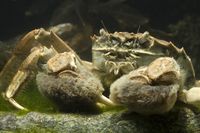Pollution and scavengers
Decomposers typically live on the sea floor and include species like crabs, hermit crabs, whelks and starfish.[1] They feed primary on decaying organic matter, which can often contain high concentrations of pollutants. [2] Therefore, decomposers tend to have higher pollutant contents than other zoobenthos. This although they both (unlike marine mammals and sea birds) also acquire a large part of their pollutants through direct contact with the water; while acquiring oxygen from the water, pollutants can be adsorbed as well.
Crabs, especially their larvae, appear to be vulnerable to pesticides[3], which resulted during the 1960s in the collapse of the Chesapeake Bay crab fishery, due to a pesticide called keptone.
Below you can find some links to Belgian case studies on ecotoxicology in marine scavengers.
Case studies
Case study 1: Common starfish can act as a bioindicator for heavy metal pollution[4]
References
- ↑ Moore P.G., Howarth J., 1996 Foraging by marine scavengers: Effects of relatedness, bait damage and hunger. Journal of Sea Research, Volume 36, Issues 3-4, P. 267-273
- ↑ Voorspoels, S.; Covaci, A.; Maervoet, J.; De Meester, I.; Schepens, P. (2004). Levels and profiles of PCBs and OCPs in marine benthic species from the Belgian North Sea and the Western Scheldt Estuary. Mar. Pollut. Bull. 49(5-6): 393-404
- ↑ Levinton, J.S. (2001). Marine biology: function, biodiversity, ecology. 2nd Edition. Oxford University Press: New York, NY (USA). ISBN 0-19-514172-5. xi, 515, col. pl. pp.
- ↑ Temara, A.; Skei, J.M.; Gillan, D.; Warnau, M.; Jangoux, M.; Dubois, Ph. (1998). Validation of the asteroid Asterias rubens (Echinodermata) as a bioindicator of spatial and temporal trends of Pb, Cd, and Zn contamination in the field. Mar. Environ. Res. 45(4-5): 341-356
Please note that others may also have edited the contents of this article.
|
